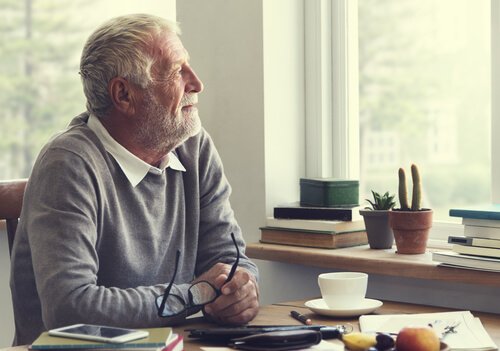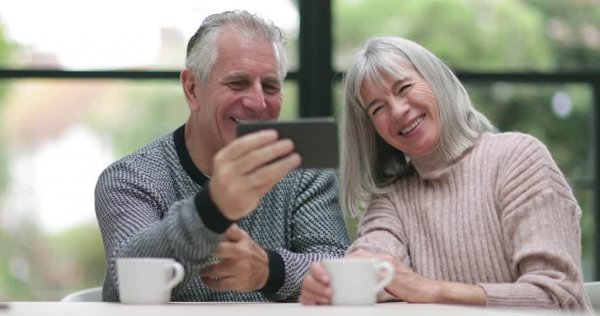How to Psychologically Help the Elderly during the Pandemic


Written and verified by the psychologist Valeria Sabater
The elderly are the most vulnerable population group in the current health crisis. Learning to psychologically help the elderly during the pandemic isn’t only a necessity, it’s a priority. As we all know, many of them are dealing with this situation from the solitude of their homes, which means it’s the group that’s most mentally at risk.
We miss the elderly and suffer for them. Once we manage to contain the disease, many commitments will be made and one of them will undoubtedly be to completely reformulate care in health centers, both for the elderly and people with disabilities.
Any society that considers itself “developed” must protect and care for the people they owe so much to. Whether in nursing homes or in their own homes, the elderly require urgent strategies, and not only ones that protect them from the virus. Their psychological well-being is also a priority.

How to psychologically help the elderly
People who are 65 years old or older are considered senior citizens, even though this is a bone of contention. Why? Because we all know that this generation of 60 year-olds is more active and full of life than ever. We’re talking here about grandparents who are always looking after their grandchildren, travel regularly, go to parties, and keep learning and setting goals for the future.
The elderly is one of the largest population groups in society. As you well know, we live in an aging society, and the elderly have very diverse needs.
Some are very active retirees, while others are dependent elderly people who need continuous care. Some of them live alone, others with their partners, and some with larger family units. But all of them have suddenly found themselves in a situation where they’re the most vulnerable. As such, their confinement measures are more severe. They’ve been without direct contact with their children and grandchildren for a long time now. The effects of this situation can be very severe.
Social networks to help the elderly
Society simply can’t neglect the elderly. Thus, we must care for their needs.
Neighbors are often the closest point of contact for our elderly folks, especially if they’re alone or if their families live very far away. Thus, finding out if they’re okay or if they need something should be a part of our everyday lives.
Technology is their greatest ally
In the current situation, technology is the bridge that allows us to connect with each other. For our elderly folks, they’re open windows to talk to their children and grandchildren through, as well as their friends.
Often, the simple fact of knowing they have a video call that day really makes their day worthwhile. It forces them to get dressed, think about what they’re going to say, remember anecdotes, and get ready to explain them.

Mental activities to keep the brain active
Everyone should devote time to the activities that are most beneficial to them and that will keep them most amused. Our parents or grandparents often love to do crossword puzzles, Sudokus, knit, paint, and cook, among other activities.
It’s important that they also know about the many resources available on their cell phones and computers that can help them exercise their minds. These online games are always beneficial.
Physical exercise
To psychologically help the elderly during the pandemic, it’s also a good idea to advise them to do moderate exercise. However, they should always be aware of their limitations and not take any risks.
Many of our mothers, fathers, and grandparents are used to taking walks. In the current situation, this has been curtailed somewhat, depending on the country they live in. If they can’t take walks or aren’t allowed to go out, they should find other ways to stay active.
An example could be taking the stairs instead of the elevator up to their apartment. Also, they can do gentle stretching exercises or yoga adapted to their age and physical condition.
Guidelines to control time and improve memory
One of the most common problems that many elderly folks suffer from is mental confusion and disorientation. For that reason, it’s good for them to perform tasks that keep them focused on the here and now, as well as connected with their identity and personal lives.
Ideally, they should follow daily routines. Keeping a diary and writing down what day it is, what they did yesterday, and what they plan to do the next day is a great idea. Also, looking at photos albums is another really positive activity.

The late evening is the best time to make video calls with elderly relatives
Older people often feel discouraged and sad when the sun goes down. This time of day is especially difficult for those who suffer from dementia. In fact, sundown syndrome is a very common mental condition among older people. This condition is characterized by suprachiasmatic nucleus alterations and melatonin deficit.
That’s why it’s best to give them a call at that time of the day. Ask them how their day went, what they ate, and how they’re doing. After making sure they’re well, you could guide the conversation towards the following topics:
- Recalling positive moments from the past to stimulate their memory.
- Suggesting things that you’ll do with them when everything is over, as this will keep them hopeful.
- Reduce and rationalize their fears. Many older people feel more scared when they see the news. Thus, you should try to calm them down and assure them that everything is fine.
In conclusion, we can all psychologically help the elderly during the pandemic. You can be the neighbor who does their shopping, the grandson who sends them loving and funny messages, and the child that assures them that you’ll soon be able to hug each other again.
The elderly are the most vulnerable population group in the current health crisis. Learning to psychologically help the elderly during the pandemic isn’t only a necessity, it’s a priority. As we all know, many of them are dealing with this situation from the solitude of their homes, which means it’s the group that’s most mentally at risk.
We miss the elderly and suffer for them. Once we manage to contain the disease, many commitments will be made and one of them will undoubtedly be to completely reformulate care in health centers, both for the elderly and people with disabilities.
Any society that considers itself “developed” must protect and care for the people they owe so much to. Whether in nursing homes or in their own homes, the elderly require urgent strategies, and not only ones that protect them from the virus. Their psychological well-being is also a priority.

How to psychologically help the elderly
People who are 65 years old or older are considered senior citizens, even though this is a bone of contention. Why? Because we all know that this generation of 60 year-olds is more active and full of life than ever. We’re talking here about grandparents who are always looking after their grandchildren, travel regularly, go to parties, and keep learning and setting goals for the future.
The elderly is one of the largest population groups in society. As you well know, we live in an aging society, and the elderly have very diverse needs.
Some are very active retirees, while others are dependent elderly people who need continuous care. Some of them live alone, others with their partners, and some with larger family units. But all of them have suddenly found themselves in a situation where they’re the most vulnerable. As such, their confinement measures are more severe. They’ve been without direct contact with their children and grandchildren for a long time now. The effects of this situation can be very severe.
Social networks to help the elderly
Society simply can’t neglect the elderly. Thus, we must care for their needs.
Neighbors are often the closest point of contact for our elderly folks, especially if they’re alone or if their families live very far away. Thus, finding out if they’re okay or if they need something should be a part of our everyday lives.
Technology is their greatest ally
In the current situation, technology is the bridge that allows us to connect with each other. For our elderly folks, they’re open windows to talk to their children and grandchildren through, as well as their friends.
Often, the simple fact of knowing they have a video call that day really makes their day worthwhile. It forces them to get dressed, think about what they’re going to say, remember anecdotes, and get ready to explain them.

Mental activities to keep the brain active
Everyone should devote time to the activities that are most beneficial to them and that will keep them most amused. Our parents or grandparents often love to do crossword puzzles, Sudokus, knit, paint, and cook, among other activities.
It’s important that they also know about the many resources available on their cell phones and computers that can help them exercise their minds. These online games are always beneficial.
Physical exercise
To psychologically help the elderly during the pandemic, it’s also a good idea to advise them to do moderate exercise. However, they should always be aware of their limitations and not take any risks.
Many of our mothers, fathers, and grandparents are used to taking walks. In the current situation, this has been curtailed somewhat, depending on the country they live in. If they can’t take walks or aren’t allowed to go out, they should find other ways to stay active.
An example could be taking the stairs instead of the elevator up to their apartment. Also, they can do gentle stretching exercises or yoga adapted to their age and physical condition.
Guidelines to control time and improve memory
One of the most common problems that many elderly folks suffer from is mental confusion and disorientation. For that reason, it’s good for them to perform tasks that keep them focused on the here and now, as well as connected with their identity and personal lives.
Ideally, they should follow daily routines. Keeping a diary and writing down what day it is, what they did yesterday, and what they plan to do the next day is a great idea. Also, looking at photos albums is another really positive activity.

The late evening is the best time to make video calls with elderly relatives
Older people often feel discouraged and sad when the sun goes down. This time of day is especially difficult for those who suffer from dementia. In fact, sundown syndrome is a very common mental condition among older people. This condition is characterized by suprachiasmatic nucleus alterations and melatonin deficit.
That’s why it’s best to give them a call at that time of the day. Ask them how their day went, what they ate, and how they’re doing. After making sure they’re well, you could guide the conversation towards the following topics:
- Recalling positive moments from the past to stimulate their memory.
- Suggesting things that you’ll do with them when everything is over, as this will keep them hopeful.
- Reduce and rationalize their fears. Many older people feel more scared when they see the news. Thus, you should try to calm them down and assure them that everything is fine.
In conclusion, we can all psychologically help the elderly during the pandemic. You can be the neighbor who does their shopping, the grandson who sends them loving and funny messages, and the child that assures them that you’ll soon be able to hug each other again.
This text is provided for informational purposes only and does not replace consultation with a professional. If in doubt, consult your specialist.







